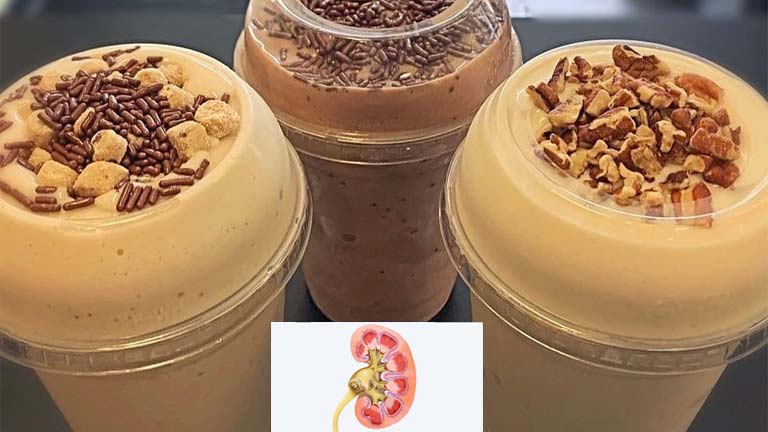Kidney stones have slowly but surely evolved from a relatively rare condition into an alarmingly disturbing contemporary health problem. The number of people who suffer from kidney stones each year is on the impetuous rise. And there seem to be more and more flaws in modern-day nutrition that advance this devastating public health trend. What does it mean for you?
Perhaps kidney stones have never run in your family. What if you also exercise and have a diet that you stick with? Most people remain under the false assumption that kidney stones will never be a problem with their health. The anecdotal evidence, however, suggests that, in this day and age, no one is immune to kidney stones.
In fact, people who lead active lifestyles and pursue ambitious dietary goals can be at risk for kidney stones. How can this possibly be true? More and more research on kidney stones suggests that meal replacement may indirectly contribute to kidney stone formation. Yet, it doesn’t necessarily mean that you have to stop drinking your favorite meal replacement shake.
What Are Kidney Stones?
The primary function of the kidneys is to remove various toxins and by-products of your body’s activity with urine. Sometimes, due to various factors, these by-products form solid compounds with the mineral salts that circulate in the kidneys. These solid compounds don’t dissolve by themselves and because of this, they endanger the health of the body’s urinary system.
These solid compounds that can form and stay in the kidneys are what everyone refers to as ‘kidney stones. But despite their seemingly innocent name, kidney stones are far from being a joke. In fact, all kidney stones can seriously hurt you and always require medical attention as well as careful treatment.
Not all kidney stones, however, represent the same solid compound. Depending on what they consist of, you can distinguish between various types of them. Being able to do so is crucial to understanding how kidney stones occur and how you can prevent them.
The following two types of kidney stones amount to approximately 90% of all kidney stones that patients suffer from:
Calcium stones: This type of kidney stone is the most common. When calcium in urine binds to oxalate, a common by-product of metabolism, calcium oxalate stones occur. These represent the majority of calcium stones and form in acidic urine. If calcium in urine binds to phosphate, a common food additive, and preservative, calcium phosphate stones form. These represent a much less common type of calcium stones and only occur in alkaline urine. Both kinds of calcium stones amount to up to 80% of all kidney stones.
Uric acid stones: These are the second most common type of kidney stones. When uric acid in urine reaches excessive concentrations, urine becomes too acidic. If such an environment persists in the kidneys, it facilitates the formation of uric acid stones. These stones amount to up to 10% of all kidney stones.
While these two types of kidney stones are the most common, there are other types too. The much less common struvite stones may sometimes occur among women as a result of urinary tract infections. And the rare cystine stones only occur in patients who suffer from the genetic disorder cystinuria. Since both of these types are not very common and have a narrow genesis, they are unlikely to affect you.
Are You At Risk For Kidney Stones?
You now know the basics of how the two most common types of kidney stones occur. This will help you better understand what causes calcium and uric acid kidney stones to form. And what you can you do to protect your own kidneys from these two types of kidney stones?
There are four major factors that can contribute to the formation of calcium and uric acid kidney stones:
High sodium intake:
Sodium is the plague of the modern diet. From salted pretzels to canned and processed foods, manufacturers like to put sodium in almost every meal they make. This makes it virtually impossible to keep track of sodium intake and makes most people consume it in excess.
When your body receives more sodium than it needs, excessive sodium accumulates in the kidneys. Your kidneys then start pulling more calcium into urine to gradually exchange the excessive sodium for calcium. This leads to an increase in calcium in the urine.
If the urine contains an excess of oxalate or phosphate during this process, this creates a recipe for disaster. Depending on the acidity of urine, the excessive calcium may bind to the excessive oxalate or the excessive phosphate. As a result of this, calcium oxalate or calcium phosphate kidney stones may occur in the kidneys.
Excessive oxalate production or consumption:
Oxalate is a naturally occurring by-product of the body’s metabolism. For instance, your body always produces some oxalate as a result of breaking down and digesting protein.
Many foods, however, also contain oxalate. Most kinds of berries, spinach, nuts, chocolate, and sweet potatoes are all foods that are naturally high in oxalate.
In and of itself, oxalate does not cause kidney stones. But when it’s present in the kidneys in excess, oxalate can bind to calcium and form calcium oxalate stones.
Chronic dehydration
This factor can be largely self-explanatory. Day and night your kidneys clean your blood from all the things your body doesn’t need inside anymore. From dangerous toxins to various metabolic by-products, your kidneys always need to quickly excrete those things from your body. It can only be natural for your kidneys to require a sufficient amount of fluids to perform this job smoothly.
Unfortunately, the majority of people don’t give this any thought. Instead, they go about their days polluting their bodies with all sorts of things their kidneys have to remove. And as they do all that, they never drink as much water as they actually need. Stuck in a state of constant dehydration, they place their kidneys under excessive and unnecessary stress.
When the kidneys don’t receive enough water, the levels of uric acid in them start to rise almost exponentially. This creates a highly acidic environment in the kidneys. As the body tries to counter it with calcium, the levels of calcium in urine start to rise. As a result, the kidneys become a favorable environment for both the calcium and uric acid stones formation.
Excessive sugar intake:
The modern diet includes a plethora of foods that can be high in various forms of sugar. And just like in the case of sodium, it makes it hard to monitor the intake of sugar precisely.
There is no direct route in which sugar can cause kidney stones to occur. Yet, various forms of sugar can viciously contribute to the formation of kidney stones in ways that are subtle.
Sucrose, for instance, requires significant amounts of calcium for its digestion. As a result, its consumption often leads to elevated levels of calcium in the urine.
Fructose, on the other hand, triggers the release of purines that assist in its digestion. The further breakdown of purines leads to the production of uric acid and its increase in urine as well.
The above list of factors that contribute to kidney stone formation is not exhaustive. But the above four factors are the major subtle routes through which kidney stones gradually become a health problem. What can you do to counter their influence if the above list resonates with your diet way too much?
Minimize the Risk of Kidney Stones
Understanding the mechanisms at the core of the above four factors that lead to kidney stone formation is vital. Doing so will allow you to adjust your diet before kidney stones start knocking on your urinary health’s door.
You can significantly minimize the risk of developing calcium and uric acid kidney stones if you:
Drink plenty of water: Even if all the other risk factors are present, sufficient water intake can trump all of them. You drinking enough clean water is all your kidneys need to filter out anything your body doesn’t benefit from.
Minimize sodium intake: Excluding canned and processed foods, salty snacks, and table salt from your diet yields major benefits for kidney health. By eliminating the excess sodium from your diet, you short-circuit the entire mechanism of calcium stone formation.
Consume less oxalate with food: You can’t prevent your body from producing oxalate. But it doesn’t mean you have to forget about foods that are high in oxalate either. Simply up your calcium intake and the calcium in your diet will balance out the oxalate intake for you.
Cut down on sugar: Minimizing sugar consumption in your diet benefits not only your urinary system but your entire health as well. The less overall sugar you consume, the further you safeguard your kidneys from calcium and uric acid stones formation.
Do Meal Replacement Shakes Increase the Risk of Kidney Stones?
Protein and meal replacement are often indispensable to people who strive to achieve body transformation despite genetic odds. However, suggests that the protein in them can cause kidney stones. We can critically assess this claim using the above information about how kidney stones occur and what causes them.
Protein does indeed interact with two of the mechanisms that lead to kidney stones formation:
It increases levels of calcium in urine: Protein requires an acidic environment for its effective breakdown and digestion. As a result, its ingestion naturally promotes such an environment. To control the acidic environment, the body mobilizes calcium, and this creates an increase in calcium concentration in urine.
It produces oxalate: Oxalate is one of the body’s most common metabolic by-products. It’s especially the case when it comes to protein digestion. When your body digests protein, it naturally produces oxalate which leads to an increase in its concentration in urine.
Both of these interactions, however, are neutral. This means that although protein has the potential to contribute to kidney stone formation, it doesn’t necessarily do so. In fact, it can only cause kidney stones through the above two mechanisms if you consume it in excess. And only if you do it consistently over a significant period of time.
The popular belief that protein and meal replacement can cause kidney stones is only partially true then. Consistent abuse of protein from any source. It can place significant stress on your kidneys. This can lead to a rise in oxalate and calcium in the urine and create favorable environment for kidney stones. Yet, none of this happens when you consume protein, methodically and in moderation.
Make Your Meal Replacement Shakes Kidney-Friendly
If the above information is not enough to alleviate your concerns, there’s something you can do to feel safer. The following tips can help you make your meal replacement shakes kidney-friendly. Here’s what you can do:
Use only plant-based proteins: Plant-based proteins are easier for the body to digest than proteins from animal sources. Go for protein and meal replacements that rely on protein from brown rice, hemp, or pea. And abstain from those that rely on whey or casein.
Food with potassium citrate is a very potent urinary alkalinizer. As such, it reduces the acidity of urine by helping the kidneys get rid of uric acid faster. As a result, potassium citrate can impede kidney stone formation.
Blend with water: Blending your shakes with pure water, as opposed to milk or juices, can become an additional source of hydration.
Sweeten naturally: Choosing to sweeten your shakes with small portions of fruits and berries can help you avoid too much sugar.
Addressing the key factors that cause kidney stones is key to never having to suffer from them. And if you manage these factors properly, meal replacement shakes will never pose a threat to your kidney health.




